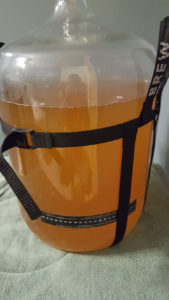Grain Bill / Fermentables
- 6 lbs 2-Row Briess Pale Malt
- 2 lbs Flaked Maize
- 2 lbs Instant Rice
Hops
- 0.5 oz Willamette (4.8 AA)
- 0.5 oz Crystal(4.8 AA)
Yeast
- Danstar Nottingham
Gravity
- OG 1.054
- FG 1.015
- ABV 5.12%
- IBU 18.44
Brew Day
Heat 5 gallons of water to 162°.
Gently dough in grains until all grain is covered by water.
Mash grains at 152° for 90 minutes.
Remove “grain bag” and allow grains to drain.
Rinse grains using a colander and get every last drop of wort potential.
Bring wort to a boil for 20 minutes. (This was necessary to get all of the wort into a single brew pot.)
Add all hops and continue boil for 60 minutes.
Reduce wort temperature to 68° and take OG reading.
Sufficiently aerate and transfer to primary fermenter.
Pitch dry yeast directly into wort.
Allow beer 2 weeks in the primary to adequately ferment and cleanup any diacetyl produced during fermentation.
Transfer to secondary for 1 week adding 1/2 tsp gelatin to clear.
Bottle and wait another 2 weeks…
Enjoy!
Notes:
- April 30, 2017, Brew Day
- Adjusted mash pH to 5.5 using 1/4 tsp citric acid.
- This recipe was adapted from http://www.homebrewtalk.com/showthread.php?t=66503
- 32 Hours, first signs of activity in the airlock. Unfortunately, this batch was too large for one of the spare glass carboys, so it is fermenting in an opaque plastic bucket. Ambient room temperature is around 66°, but the bucket is mostly submerged and has had regular additions of ice water, keeping the temperature closer to 60°.
- 50 Hours, constant stream of bubbles in the airlock with 1 or 2 per second. The heat sink temperature now matches room temperature at 66.
- 2 Weeks, gravity is 1.019 and fermenter reeks of sulfur.
- 3 weeks, gravity is appears to have stopped at 1.015. Transferred to secondary on 1/2 tsp gelatin. Beer is already extremely clear and has a strong “beer” smell, not sure if it is from the yeast or the hops yet, but it is a good smell.
- 7 Weeks, (due to vacation schedule) bottled an extremely clear beer. Did not add yeast, hoping there will be enough residual yeast to prime bottles, but I know I’m pushing it.
- After sampling a couple of these, they need more carbonation than a typical beer to compensate for the fact that it tastes like a super light beer, think Keystone Light.
- I would make this again, but add 0.5 oz more bittering hops, a 0.5 oz 5 minute addition, drop the corn and rice content to 1lb each and carbonate slightly more (~1/8 cup sugar) than normal.
